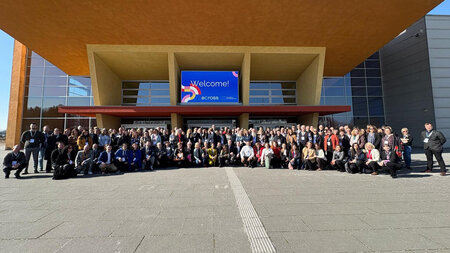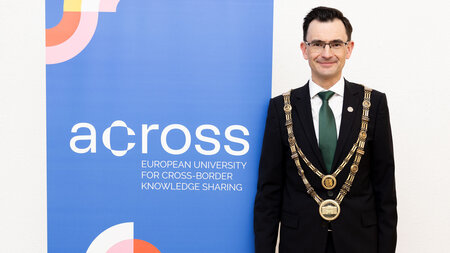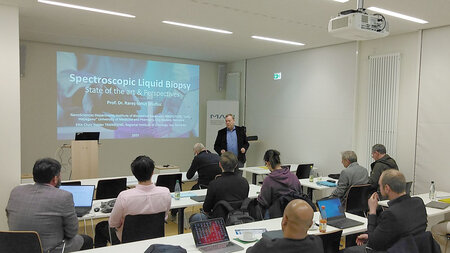Better Medical Care for Diabetic Eye Disease Through AI
Chemnitz University of Technology participates in research project funded by the Federal Ministry of Education and Research with more than eleven million euros to establish a research data infrastructure for more reliable and AI-based progression modeling in diabetes-related eye diseases
-

Jun.-Prof. Dr. Danny Kowerko participates in the digital progress hub Medical Informatics Hub in Saxony funded by the Federal Ministry of Education and Research. Photo/Collage: private and panumas (pexel.com/CCo)/Matthias Fejes
Modern medicine is to become more digital, more individualized and thus more efficient. This applies in particular to cancer and diabetes treatment. For example, the use of artificial intelligence (AI) for more efficient and individualized diagnostics and therapy when checking against medical databases is essential. To advance these projects, the Federal Ministry of Education and Research is funding the digital progress hub Medical Informatics Hub in Saxony (MIHUBx) with 11.2 million euros. The project involves TU Dresden, the University Hospital Dresden, the Junior Professorship of Media Computing (Head: Jun.-Prof. Dr. Danny Kowerko) of Chemnitz University of Technology, Klinikum Chemnitz (Chemnitz Hospital) and Mittweida University of Applied Sciences.
Jun.-Prof. Danny Kowerko is the project leader of the use case "Ophthalmology meets Diabetology".whichis one of three subprojects within the overall project MIHUBx. In addition to Chemnitz University of Technology, Klinikum Chemnitz and the Professorship of Media Informatics (Head: Prof. Dr. Marc Ritter, graduate of Chemnitz University of Technology) of Mittweida University of Applied Sciences as well as Prof. Dr. med. Katrin Engelmann, Chief Physician of the Eye Clinic of Klinikum Chemnitz gGmbH, and Prof. Dr. med. Peter Schwarz, Head of Medical Clinic III with a focus on prevention and care of diabetes (type 2) as well as medically responsible for the subarea Diabetology as part of the use case are involved in this subproject. This sub-project accounts for a total of around three million euros, of which around 800,00 euros will go to Chemnitz University of Technology.
In their use case "Ophthalmology meets Diabetology", Danny Kowerko and his team from Chemnitz University of Technology contribute their expertise in AI-based detection and progression modeling of diabetic eye diseases. In this way, diagnostics and therapy are to be improved on the basis of larger amounts of data. In concrete terms, the aim is to combine classical machine learning methods with modern deep learning-based methods and to visualise them in a dashboard.
The dashboard then clearly shows, for example, disease progression based on data such as visual acuity, tissue condition of the retina (so-called "OCT" findings), medical history, previous diagnostics and therapy. "Among other things, we want ophthalmologists to be able to make a better prognosis from the comparison and visualization of similar disease progressions in combination with recommendations using our AI-based methods," says Kowerko.
Together, the participants would like to create interfaces between medical partners, such as eye clinics, ophthalmologists in private practices, general practitioners, diabetologists, and data processing centers as a first step. In addition, a central infrastructure for data integration is to be developed. For the use case coordinated by Chemnitz University of Technology, this means that a data set specific to the progression modeling of diabetes-related eye diseases must be created. The development of a consistent research data infrastructure creates the database for more reliable and AI-based progression modeling of diabetes-related eye diseases.
The approaches described are intended to counteract demographic change and the associated thinning out of the network of specialists in rural regions by providing more efficient treatment for individual patients. To do this, understanding and trust in the technology must first be established. "To do this, we work closely with physicians, for example, to involve them in the development process and incorporate their feedback," says Kowerko. This feedback is incorporated, for example, into the presentation of the dashboard, which is thus tailored specifically to users from the practice. The focus is on maximum practical relevance for ophthalmologists, diabetologists and general practitioners to ensure more efficient patient care.
For more information, contact Jun.-Prof. Dr. Danny Kowerko, phone +49 371 531-35660, e-mail danny.kowerko@informatik.tu-chemnitz.de.
(Translation: Brent Benofsky)
Matthias Fejes
22.05.2022





